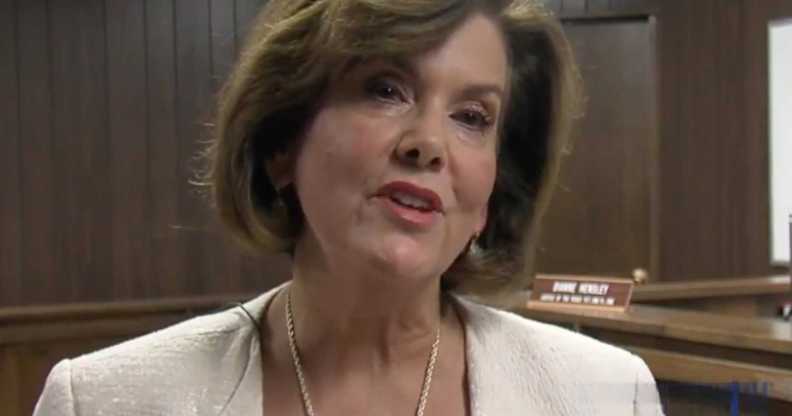Anti-LGBTQ+ Texas judge says Supreme Court ruling gives her the right to refuse same-sex weddings

Dianne Hensley received a warning in 2019 for refusing to officiate same-sex marriages. (25 News KXXV/ YouTube)
A Texas judge is arguing that she was illegally punished for refusing to officiate same-sex marriages, following the Supreme Court’s controversial recent ruling permitting anti-LGBTQ+ discrimination.
Dianne Hensley, a justice of the peace in McLennan County, faced a misconduct warning by the Texas Commission on Judicial Conduct in 2019 for insisting that she will only marry straight couples.
The warning stated that Hensley’s bias cast “doubt on her capacity to act impartially to persons appearing before her as a judge due to the person’s sexual orientation”.
Hensley, who has officiated around 70 opposite-sex marriages between 2016-2019, has refused to officiate same-sex couples’ marriages ever since marriage equality was legalised in Texas in 2015.
In 2019, Hensley filed a lawsuit against the Texas Commission on Judicial Conduct seeking $100,000 in damages over its misconduct finding, claiming that her rights have been infringed upon.
Hensley, who is represented by anti-LGBT lobbying group First Liberty Institute, is also seeking the right for all justices of the peace to discriminate against gay couples in the lawsuit.
Hensley’s lawyers update the 2019 lawsuit after Supreme Court ruling
This week, Hensley’s lawyers added a new brief in the case, stating that a recent Supreme Court decision means that she has a constitutional right to only officiate opposite-sex weddings.
On 30 June, the Supreme Court ruled that Christian designer Lorie Smith, from Colorado, could refuse to make wedding websites for LGBTQ+ couples in 303 Creative LLC vs. Elenis.
The ruling appears to have paved way for businesses and people to refuse LGBTQ+ people services, with a hair salon in Michigan subsequently stating that it won’t serve people who “identify as anything other than a man or woman”.
The brief, which describes Hensley as a “wedding vendor” instead of a public official, states: “303 Creative was interpreting the First Amendment’s Speech Clause rather than the Texas Religious Freedom Restoration Act.
“Its holding is nonetheless instructive because it rejects the idea of a ‘compelling interest’ in forcing wedding vendors to participate in same-sex and opposite-sex marriage ceremonies on equal terms.”
Johnathan Gooch of the LGBTQ+ organisation Equality Texas, said: “The law of the land is marriage equality. It’s as simple as that.
“If judges and justices of the peace were empowered to only enforce the laws that they agreed with, we would quickly descend into anarchy.”

